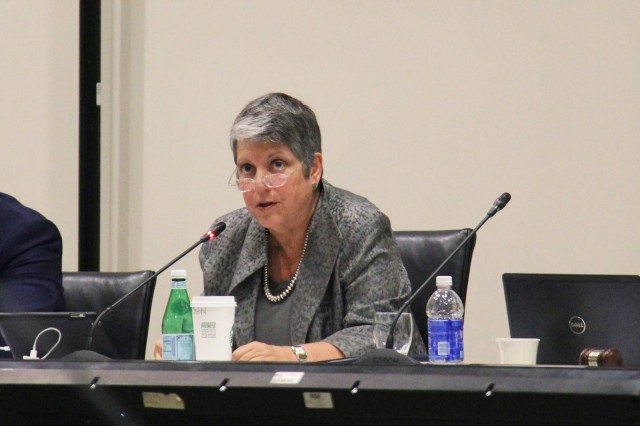A University of California Office of the President committee formed Oct. 15 will investigate the statute of limitations and interim investigation measures, among other policies, as part of a review of UC policies on handling sexual harassment and violence cases involving faculty.
UC President Janet Napolitano announced the formation of a committee Oct. 15 in response to the investigation and subsequent resignation of UC Berkeley Professor Geoff Marcy. According to a UC Berkeley press release, the investigation found Marcy had sexually harassed multiple students.
The committee, which will operate under Napolitano’s Task Force on Preventing and Responding to Sexual Violence and Sexual Assault, aims to assess whether the procedures for reporting harassment are clear to all UC constituents.
Chrissy Keenan, co-director of Bruin Consent Coalition and a fourth-year human biology and society student, said she was impressed by Napolitano’s strong response.
Dan Hare, chair of the UC System Wide Academic Senate, and Sheryl Vacca, senior vice president and chief compliance and audit officer for the UCOP, will lead the committee. Students will be selected from Napolitano’s task force, Hare said in an email statement.
Keenan said she thinks part of the problem with reporting and investigating faculty is that according to students, faculty members seem untouchable to students.
“Sexual violence is based on power and it can be intimidating to report,” Keenan said. “In that sense the faculty have more unspoken protection.”
UC spokeswoman Dianne Klein said the process of reporting sexual harassment or assault by a faculty member is not much different from harassment or assault by a student. The student reports cases to the Title IX office or the Confidential Advocate’s Office, she added. While the reporting process is the same, the process of investigating and disciplining faculty is different, Klein said.
Tenured faculty have certain protections that other faculty members do not have. Only regents can dismiss tenured faculty after the investigations have been completed, Klein added.
The current statute of limitations, a law that determines how long a person has to file a lawsuit, for reporting sexual harassment and violence is three years, Klein said. The committee will decide whether the current statute of limitations needs to be revised, because claims of misconduct often occur several years before they are reported.
Keenan said she thinks survivors sometimes do not feel comfortable telling anyone or reporting their assault for a while afterward.
“We can’t say because it was four years ago, it doesn’t count,” Keenan said.
Interim procedures are measures that provide the individual reporting the harassment with additional protections while the investigation is underway. Keenan said she thinks the UC policy needs additional interim measures for sexual harassment or violence investigations that involve faculty members.
“I think we should remove faculty from teaching environments and not allow them to act as advisers to students until the investigation is over,” Keenan said.
UC spokeswoman Kate Moser said there is a systemwide policy on sexual harassment, but each campus executes the policy differently. UCLA spokesman Ricardo Vazquez referenced the UC interim sexual harassment policy when asked about UCLA’s policy for reporting sexual harassment from faculty.
UCLA’s procedure for reporting and responding to sexual harassment begins with a report to a sexual harassment officer, according to UCLA procedure 603.1. The officer then informs individuals about various ways to report the assault, including an early resolution, a formal investigation or grievance procedures. The officer would also discuss interim protections, such as making alternative housing arrangements.
The goal of an early resolution is to resolve the issue as quickly as possible with the cooperation of all parties. If an early resolution fails, the complainant can pursue a formal investigation. In a formal investigation, an investigator reviews the complaint and makes a formal report, which can lead to a referral for disciplinary action. A grievance procedure is a formal statement of complaint.
The investigator would interview the individual and the accused, and other sources as needed. After the investigation is completed, the investigator would submit a written report to officials who can resolve the complaint. Both parties are informed if the investigation found a violation of the UC policy. If investigators determine a violation, officials would decide disciplinary action, which could include termination, according to the procedure.
The committee will submit its recommendations by Feb. 29, 2016.

